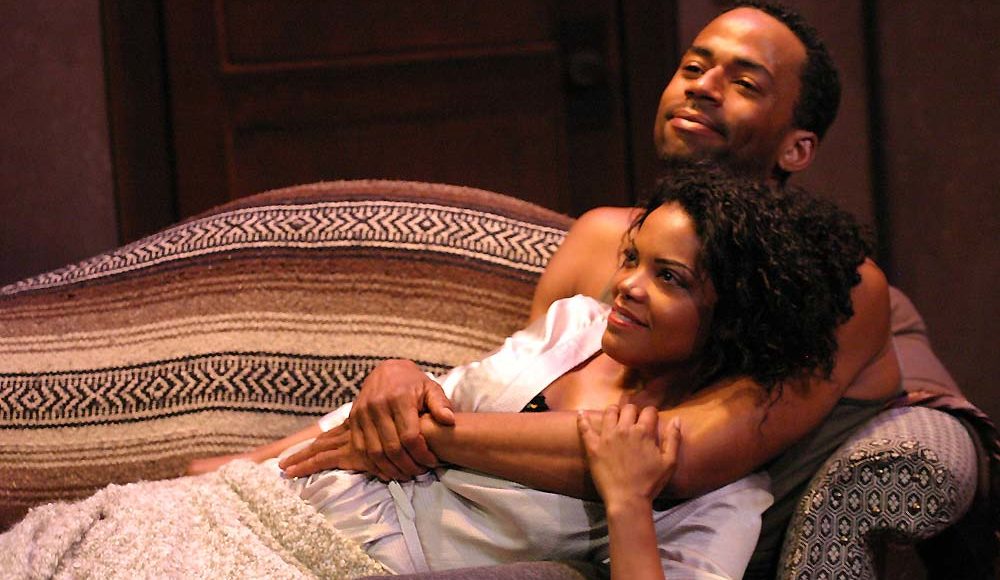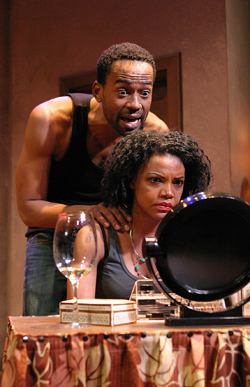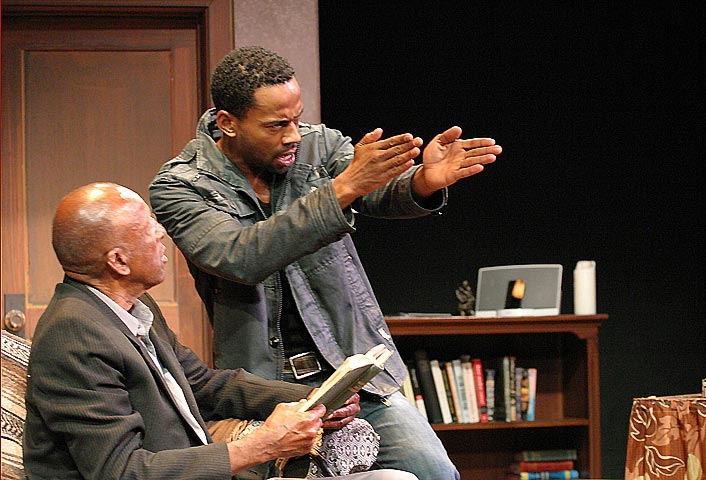Sunset Baby is an intelligently written play with a superb cast that positively gleams from those benefits which blesses any play if either worthy of or lucky enough to get a production at the Odyssey Theatre.
Playwright Dominique Morisseau comes bearing a bucket full of honors and accolades.
A rather big bucket full.
A commendation from the American Theatre Critics Association, the Edward M. Kennedy Prize for Drama, a Weissberger, a pair of NAACP Image Awards, a Jane Chambers doohickey, a Princess Grace thingamabob, we are talking some really shiny stuff here.
The tale of the drama is admirably devoid of all excess fat, and has equal measures of jocularity and the poetic which the playwright mixes with a flawless finesse.
The subject Morisseau places in her arena for consideration is multifaceted as well as compelling. Do we save our people at the cost of our families or our families at the cost of ourselves?
It is a human dilemma that has echoed down through history, in the lament that “good” fathers, be the father Marcus Aurelius or Gandhi, suffer “bad” children.
What act is the most revolutionary? Attempting to amend the wrongs of a society or guiding a child towards a rightful life?
But neither Confucianism’s world view nor the dialectics of Marxism do much towards alleviating the personal pain and bitterness of a broken family.
Nina (Nadège August) is the child of two radicals, icons of the ’60s’ “Black Power” movement. At the play’s start, her mother, who was a chronicler of the struggles is dead, the victim of her drug habit. The same drug Nina and her hustler boyfriend Damon (Chris Gardner) employ in the bait and switch scams they run on other blacks on New York’s tough east side.
After the addiction had shriveled away her mother’s life, Nina was surprised to find she had been left a legacy. Bundles of letters her mother wrote to her father while he was serving time in prison for a series of SLA-like (Symbionese Liberation Army) bank robberies he executed in hopes of building a war chest to fund the crusade against the racist power brokers of the time.
Now Nina finds herself besieged by sociologists, historians, poets and others seeking to purchase from her the letters, long thought lost, in order to study and research them. The bids they press on her increase, offers reaching tens of thousands of dollars.
But one man offers her nothing, feeling they are his by right, as they were written to him.
Kenyatta, (Vincent J. Isaac) Nina’s father is only recently released from prison. His years behind bars have made them strangers to each other, and Nina intends that they remain so.
Blaming her father’s choice of the revolution over his family for her mother’s downward spiral into drugs, Nina rejects his pleas for the letters. But Damon, always on the con, sees the letters as a way of making some serious money, so long as her father is willing to meet his asking price.
All in all, it is a well conceived dramatic framework, fraught with the ore of potential conflicts, and served well by a talented cast who works down to the mother lode.
Gardner and Isaac are excellent, as the two men locked in a struggle over Nina’s letters, one in hope of regaining the past society took from him, the other in hopes of buying a future that same society seems determined to deny him. Their encounter is one of the play’s most potent scenes as they stare across the vast chasm of history, mocking and accusing one another, a doppelganger formed of their own efforts and failures.
Nadège August as Nina, is the eye of the storm and provides a remarkable resonance to her role as she grapples to keep the letters, the only remaining remnant of her mother she has left. On a stage bursting with fine performances her work is at the apex.
As to the play itself, I believe the question asked here is one of what obligations we bear, and to whom do we owe them?
What does a man owe his woman, what does a child owe a parent or a parent a child? And if they fail in their obligations, does that release us from ours? Is the greatest obligation, that which is owed to the present, the future or history? Or is it that which is owed to oneself?
Sitting in the audience at the Odyssey I was conscious of what a finely crafted work was before me, and of the talent and skills which had gone into its staging.
So what is the problem here?
The problem is how very tame it all felt, and – for lack of a better term – how very old fashioned.
Morisseau has written a tidy little play about people and situations that are anything but. In a piece about the price of revolution in a society and ourselves, it seems a contradiction to have the composition stay neatly within the lines.
Jeffrey Hayden is a director of great experience and proven abilities. He is also “an old white guy.”
Some, no doubt, will question if the play could have been better served by some one younger and more in tuned with the social realities of race in America. But does that mean the thought of a young, black woman directing That Championship Season should give us pause?
I don’t think so. While of course aberrations abound, as they do in any system, theatre is ultimately a meritocracy in which talent prevails.
While Hayden, as director, may be held responsible for not addressing or concealing the weaknesses of the work, those blemishes are in the weave itself.
Morisseau obviously knows the back story supporting the premise of her piece, and one feels from the language she utilizes that she has immersed herself in the works of Bullins, Wilson and Shange.
Yet there is a prevailing sense of déjà vu that cloaks the works, the feeling that we’ve covered this ground before.
A work of the theatre is an edifice assembled on the fate befalling characters in conflict with their past. A feud between two families, a father’s murder, a loveless marriage, a rash act on the road to Thebes – whatever the past in question may be – drama cannot feel like history.
This lapse on Morisseau’s part is, at worst, a modest flaw.
But all the imperfections and wrinkles this show may or may not be afflicted by, including a set that invokes Let’s Make a Deal more than New York’s East Side, all combined would still be too slight to mar this smart production and exceptional cast and to place it beyond an audience’s enjoyment.
* * *
(Photos by Enci Box)
Odyssey Theatre Ensemble presents the
West Coast premiere of ‘Sunset Baby’ by Dominique Morisseau
Directed by Jeffrey Hayden
• Cast: Nadège August, Chris Gardner and Vincent J. Isaac
April 25-June 7:
• Wednesdays at 8 p.m.: May 6 and May 27 ONLY
• Thursdays at 8 p.m.: April 30, May 14, May 21 and June 4 ONLY
• Fridays at 8 p.m.: May 1, 8, 15*, 22, 29; June 5
• Saturdays at 8 p.m.: April 25 (opening); May 2, 9, 16, 23, 30; June 6
• Sundays at 2 p.m.: May 3, 10, 17, 24, 31; June 7 (no 2 p.m. matinee on April 26)
Third Friday of every month is wine night at the Odyssey: enjoy complimentary wine, snacks and mingle with the cast after the show.
At: Odyssey Theatre
2055 S. Sepulveda Blvd.
Los Angeles CA 90025
For Tickets: Phone
(310) 477-2055 ext. 2 or go to www.OdysseyTheatre.com







